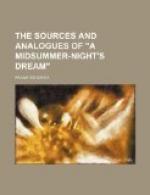Lute and ribib[49] both gangand[50],
And all manner of minstrelsy.
The most marvel that Thomas thought,
When that he stood upon the floor,
For fifty hartes in were brought, 195
That were bothe great and store[51].
Raches lay lapping in the blood;
Cookes came with dressing-knife;
They brittened[52] them as they were wood;
Revel among them was full rife. 200
Knightes danced by three and three,
There was revel, gamen, and play;
Lovely ladies, fair and free,
That sat and sang on rich array.
Thomas dwelled in that solace 205
More than I you say, parde;
Till on a day, so have I grace,
My lovely lady said to me[53];
“Do busk thee, Thomas; thee buse[54] again;
For thou may here no longer be; 210
Hie thee fast with might and main;
I shall thee bring till Eildon tree.”
Thomas said then with heavy cheer[55],
“Lovely lady, now let me be;
For certes, lady, I have been here 215
Nought but the space of dayes three!”
“For sooth, Thomas, as I thee tell,
Thou hast been here three year and more;
But longer here thou may not dwell;[56]
The skill[57] I shall thee tell wherefore. 220
To-morn[58], of hell the foule fiend
Among this folk will fetch his fee;
And thou art mickle man and hend[59],
I trow full well he would choose thee.
For all the gold that ever may be 225
From hethen[60] unto the worldes end,
Thou beest never betrayed for me;
Therefore with me I rede[61] thou wend.”
She brought him again to Eildon tree,
Underneath that greenwood spray. 230
In Huntlie banks is merry to be,
Where fowles sing both night and day.[62]
“Farewell, Thomas, I wend my way,
For me buse[63] over the bentes brown.”
—Lo, here a fytte; more is to say[64] 235
All of Thomas of Erceldoune.
And all manner of minstrelsy.
The most marvel that Thomas thought,
When that he stood upon the floor,
For fifty hartes in were brought, 195
That were bothe great and store[51].
Raches lay lapping in the blood;
Cookes came with dressing-knife;
They brittened[52] them as they were wood;
Revel among them was full rife. 200
Knightes danced by three and three,
There was revel, gamen, and play;
Lovely ladies, fair and free,
That sat and sang on rich array.
Thomas dwelled in that solace 205
More than I you say, parde;
Till on a day, so have I grace,
My lovely lady said to me[53];
“Do busk thee, Thomas; thee buse[54] again;
For thou may here no longer be; 210
Hie thee fast with might and main;
I shall thee bring till Eildon tree.”
Thomas said then with heavy cheer[55],
“Lovely lady, now let me be;
For certes, lady, I have been here 215
Nought but the space of dayes three!”
“For sooth, Thomas, as I thee tell,
Thou hast been here three year and more;
But longer here thou may not dwell;[56]
The skill[57] I shall thee tell wherefore. 220
To-morn[58], of hell the foule fiend
Among this folk will fetch his fee;
And thou art mickle man and hend[59],
I trow full well he would choose thee.
For all the gold that ever may be 225
From hethen[60] unto the worldes end,
Thou beest never betrayed for me;
Therefore with me I rede[61] thou wend.”
She brought him again to Eildon tree,
Underneath that greenwood spray. 230
In Huntlie banks is merry to be,
Where fowles sing both night and day.[62]
“Farewell, Thomas, I wend my way,
For me buse[63] over the bentes brown.”
—Lo, here a fytte; more is to say[64] 235
All of Thomas of Erceldoune.
* * * * *
REGINALD SCOT
DISCOVERY OF WITCHCRAFT (1584)
From “To the Readers.”
I should no more prevail herein [i.e. in securing attention] than if a hundred years since I should have entreated your predecessors to believe, that Robin Goodfellow, that great and ancient bull-beggar, had been but a cozening merchant and no devil indeed.... But Robin Goodfellow ceaseth now to be much feared, and popery is sufficiently discovered.
Book I, chap. iv.—“What miraculous actions are imputed to witches by witchmongers, papists, and poets.”
[Quoted here to show that certain attributes of Shakespeare’s fairies belong also to witches.]




